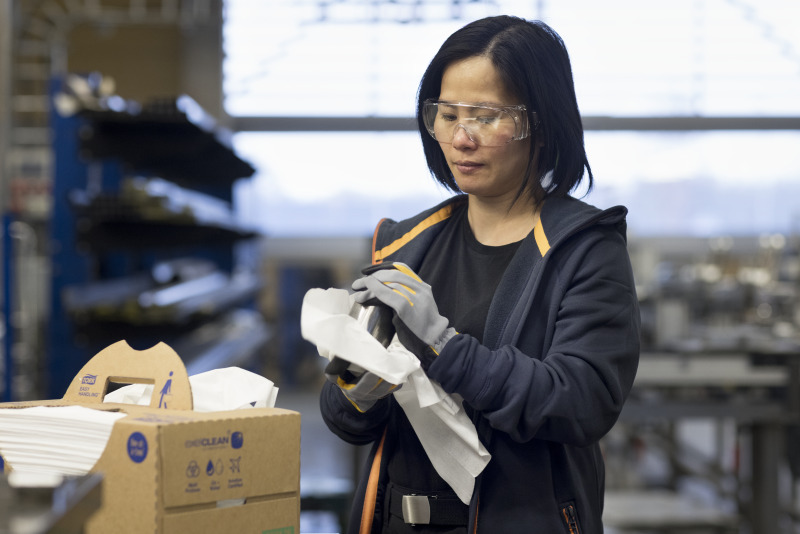Sustainability Guide for Industry: 5 ways to reduce environmental impact
Doing business more sustainably doesn’t have to mean a lot of big changes. A few small adjustments can add up to a big impact. Below you’ll find five such tips for industry from Tork to help your business continue its progress to a more sustainable future.

1. Reduce waste
Many companies have implemented lean manufacturing principles to reduce and eliminate all types of waste. Did you know 74% of machine operators agree ‘If wipers aren’t placed conveniently, I take more than I need for the task.’1
Tip: Position your wipers close to their points of use. This helps reduce the problem of inventory waste: operators taking more product than they need to avoid walking back and forth for more. Also, the use of dispensers that distribute product one-at-a-time can ensure just the right amount of is used for the task.
So, by placing cleaning products conveniently to where operators work, less inventory is wasted.

2. After use and circularity
The global population produces 2 billion tons of solid waste every year.2 Circularity has a key role to play in manufacturing’s push towards zero waste. The linear process that ends in landfill or incineration has defined so much of economic activity. A more circular economy opens the opportunity for more reuse and using waste as a resource.
Tip: Consider circularity and new ideas for after-use solutions, such as commercial composting or take back systems.
To become more circular, consider the ever-expanding options for inputs to production and uses of production by-products/scrap.
3. Responsible use of plastics and packaging
More and more businesses are pledging to reduce their reliance on plastics. As just 9% of the world’s plastic waste is recycled.3 Recent legislation is requiring change too, forcing companies to act more responsibly on the use of plastics. As there are many benefits to using plastics, it can be a challenge to address these demands. Remember responsible use means using plastic where it makes sense and securing circularity.
Tip: Look for sources that provide more sustainable plastics usage.
To help reduce your reliance on plastics, consider how your supplies and products are packaged too.

4. Responsible sourcing
In recent years, businesses have made considerable improvements to their traceability in supply chains. Many companies have integrated environmental and social requirements in their supplier standards and sourcing programs. But the complexity of the supply chain can make it hard for companies to always know exactly where goods have come from. Consider that in 2020, 85% of Fortune 500 companies published sustainability reports; this was up from only 20% in 2011.4
Tip: Look for third-party certifications. They help companies to prove sustainability performance by impartial requirements and follow up. When you see product certifications like FSC®, Green SealTM, ECOLOGO, or supplier ratings like Ecovadis certifications you know the product or supplier meets high environmental standards throughout its supply chain.
Therefore, simplify responsible sourcing with suppliers whose products have the endorsement of trusted third-party certifications.
5. Consider your carbon footprint
New government regulations have helped accelerate change. The challenge now is finding new ways to reduce carbon footprints in daily operations. Did you know 2,253 companies have committed to set science-based targets. SBTi companies now cover over a third (35%) of global market capitalization.5
Tip: Choose products and suppliers that will contribute to your total supply-chain impact.
Look beyond production inputs and consider tools, supplies and cleaning products. Review how they are delivered, used and waste is treated.
Check out the full Tork Equipped to ImproveTM – Sustainability Resource Guide which includes case study examples of how small changes have a bigger impact on your environmental footprint than you might think.
1 Tork machine operator research (July 2019)
2 The World Bank
3 OECD, Global Plastics Outlook
4 The Journal of Impact and ESG Investing Spring 2022
5 SBTi Progress Report 2021